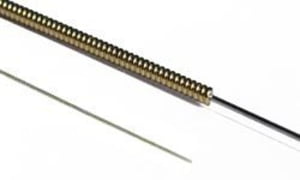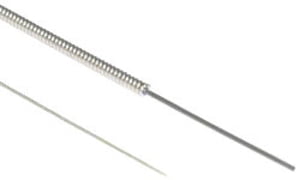4. Acoustic Guitar Strings
While magnetic properties are arguably the most important consideration in electric string design, sonic properties come to the fore with acoustic strings.
Bronze
For many years, the majority of wound acoustic guitar strings were made by winding a bronze wire around a steel core. These are often described as 80/20 - the composition of the bronze alloy employed being 80% copper and 20% tin - 85/15 is a common variant. Bronze-wound strings are known for their rich, crisp and loud sound. 80/20 is generally regarded as having a somewhat warmer tone than 85/15.
Phosphor Bronze
In this modern variant, the copper content is increased to 90% or more, with the addition of up to 1% phosphor. This results in improved resistance to corrosion and an even warmer sound. Phosphor-bronze strings are the best-selling acoustic guitar strings today.
Nickel & Steel
These windings are rarely used for flat-top acoustics or those with piezo pickups, as the resulting tone tends to be rather thin and nasal, but they can give excellent results with magnetic sound-hole pickups and archtop jazz guitars.
Gauges
Acoustic strings are generally heavier than electric strings, and the G string is almost always wound. Heavier strings have greater tension at any given pitch - this is necessary in order to physically set the guitars soundboard in motion - a large lump of wood as opposed to a pickups magnetic field! As a general rule, the bigger the guitar, the heavier the strings required for best results. Dreadnoughts tend to need twelves or thirteens, while small-bodied acoustics can sound fine with tens or elevens. Lighter sets than this are almost never used as they tend to sound weak, and also rattle excessively.
Standard acoustic sets consist of the following gauges:
| | E | B | G | D | A | E |
| Extra-Light | .010 | .014 | .022 | .030 | .038 | .048 |
| Light | .011 | .015 | .024w | .032 | .042 | .052 |
| Medium Light | .012 | .016 | .025w | .032 | .042 | .054 |
| Medium | .013 | .017 | .026w | .036 | .046 | .056 |
| Heavy | .014 | .018 | .027 | .039 | .049 | .059 |
Note that heavy gauge strings should be used with care. While slack tunings require heavier strings to prevent rattle, their use for standard tunings can exert excessive tension on the instrument, resulting in neck or bridge damage.




